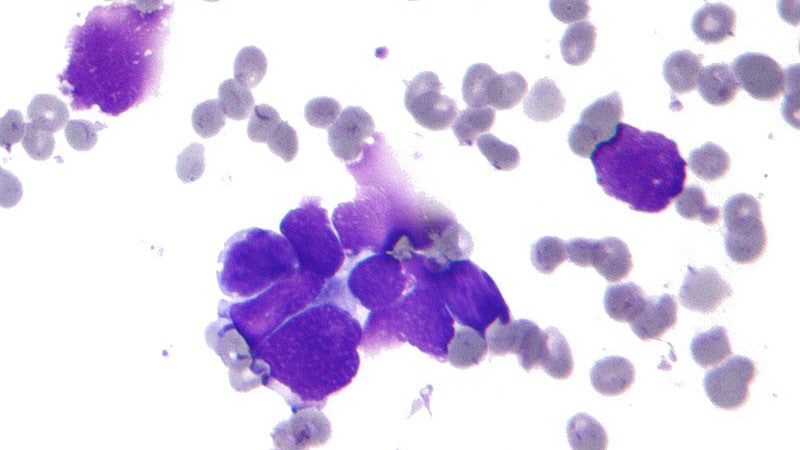—
Two patients had rapid symptom improvement and reductions in malformation volume
by
Mike Bassett,
Staff Writer, MedPage Today
July 18, 2024
Treating severe KRAS G12C-related arteriovenous malformations with sotorasib (Lumakras) appeared to be effective in a small French study.
Two adult patients with the life-threatening condition who were treated with the KRAS inhibitor had rapid reductions in symptoms and arteriovenous malformation size, reported Guillaume Canaud, MD, PhD, of the Hôpital Necker–Enfants Malades in Paris, and colleagues.
“Targeting KRAS G12C appears to be a promising therapeutic approach for patients with KRAS G12C-related vascular malformations,” they wrote in the New England Journal of Medicine.
While KRAS mutations are commonly found in many cancers, the G12C single-nucleotide mutation is particularly common in non-small-cell lung cancer (NSCLC). The authors hypothesized that since sotorasib has shown some efficacy in patients with NSCLC, it could also be an option for patients with vascular malformations found to have the KRAS G12C mutation.
First, in two mouse models carrying a KRAS G12C mutation, Canaud and colleagues showed sotorasib could reduce the volume of vascular malformations and improve survival. They then administered the drug to the two people with the condition in whom lesion biopsy showed the mutation.
Both patients received 960 mg of sotorasib (eight 120-mg pills) orally every morning during breakfast.
Patient 1
The first patient was a 24-year-old man who had been affected by a growing arteriovenous malformation on the right side of his face since birth. He had undergone 11 endovascular procedures, resulting in blindness and maxillectomy on the affected side.
These interventions failed to slow the growth of the arteriovenous malformation, and he required opioids for severe pain and antibiotics for recurrent cellulitis. He also experienced recurrent hemorrhages.
The patient enrolled in the MAV-RAPA clinical trial and received sirolimus, an mTOR inhibitor, for a duration of 6 months, but discontinued treatment due to lack of efficacy and adverse events. With his condition deteriorating in the absence of further treatment options, the man was offered sotorasib.
After 4 weeks of treatment with sotorasib, the authors reported symptomatic improvement, including reduced pain, cessation of bleeding, decreased fatigue, and noticeable aesthetic changes. After 3 months on the KRAS inhibitor, opioids and antibiotics were discontinued.
Follow-up MRI showed a sustained reduction in the volume of the vascular malformation over the course of 24 months.
The patient experienced no drug-related adverse events during the treatment period.
Patient 2
The second patient was a 45-year-old woman with a vascular malformation involving the oral cavity — especially the tongue — with extension to the right eustachian tube, leading to chronic dysfunction and recurrent middle ear infections.
Despite 20 endovascular and surgical procedures, she experienced progressive growth of the arteriovenous malformation, resulting in pain, deafness in the right ear, dysphagia, and slurred speech.
After starting sotorasib therapy, she experienced rapid clinical improvement, including deafness correction, the disappearance of pain, and reduced facial and jaw infiltration.
While her sotorasib dose was reduced to 720 mg per day due to the development of grade 1 diarrhea, no other drug-related adverse events were reported.
Imaging at 6 months showed a 19.8% reduction of the vascular infiltration in the right mastoid cells surrounding her vestibulocochlear system.
“This study shows the importance of genetic testing in vascular malformations in order to provide targeted therapy,” Canaud and colleagues concluded. “These promising results will need to be confirmed in further studies.”
![author['full_name']](https://clf1.medpagetoday.com/media/images/author/MikeBassett_188.jpg)
Mike Bassett is a staff writer focusing on oncology and hematology. He is based in Massachusetts.
Disclosures
Canaud reported receiving grants or contracts from Agence Nationale de la Recherche, Association Robert Debré pour la Recherche Médicale, Fondation Bettencourt Schueller, Fondation TOURRE, and the European Research Council, as well as consulting for Bridgebio, Novartis, and Vaderis.
Several co-authors reported industry relationships, as well as grant support.
Primary Source
New England Journal of Medicine
Source Reference: Fraissenon A, et al “Sotorasib for vascular malformations associated with KRAS G12C mutation” N Engl J Med 2024; DOI: 10.1056/NEJMoa2309160.
Note: This article have been indexed to our site. We do not claim legitimacy, ownership or copyright of any of the content above. To see the article at original source Click Here













